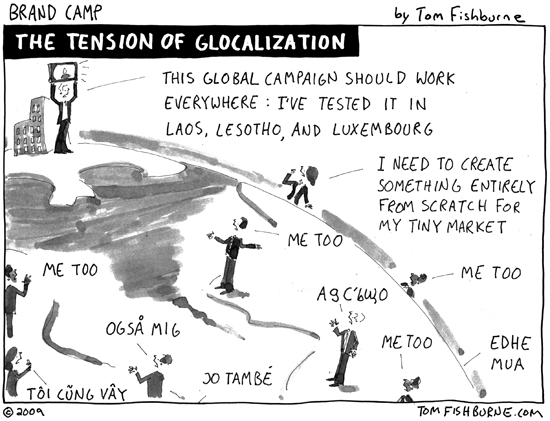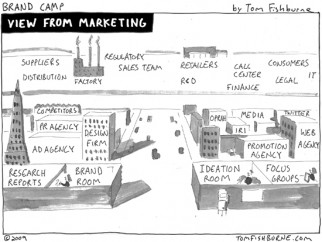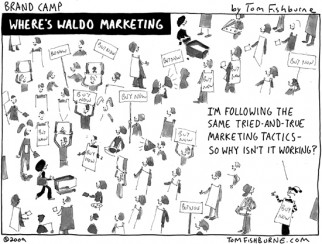I’ve thought a lot about “thinking global, acting local” since I moved to the UK to help launch an American brand two years ago.
It’s a constant tug-o-war between global consistency and local adaptation. Recently, I had coffee with Patrick Cairns, CEO of Plum Baby, who spent a lot of time in global roles with Unilever. He described the standard dichotomy as being either “mindlessly global” or “hopelessly local”.
Far too often, the global brand manager assumes one-size-fits-all and the local brand manager assumes his or her particular market necessitates the creation of something completely unique.
I developed a visual storytelling project with a large global company recently, and we talked a lot about this theme. In the process, we characterized the “mindlessly global” mindset as testing in three random markets like “Laos, Lesotho, and Luxembourg” and assuming the results would give you confidence in the rest of the world (thanks, Simon and Alastair). I liked the line so much, I used it again in this cartoon.
Years ago, I interviewed with Apple and got in an argument with a director about the importance of taking local market needs into account (they love argumentative stress interviews at Apple). He said that local customization was a cop-out and a sign of failure. He argued that a consumer insight should be universal if you distill it far enough. If your consumer insight isn’t universal, it’s not a good enough consumer insight. In other words, being “hopelessly local” is lazy.
When I arrived in the UK, I was interested to see virtually the same Apple ads, but with local British actors (the guys in the middle). Out of curiosity, I found the Japanese version (the guys on the right). Same consumer insight, same campaign, right down to the slouching posture of the Mac guy.
After two years of sliding along the global/local continuum, I think the goal involves inverting the standard dichotomy: being “mindfully global” and “selectively local”. The problem is that this is really hard to do. It takes a lot of discipline and coordination on both sides of the table. When the two sides have very different priorities, each views the other as a cumbersome burden.
Like most things in business, it’s about progress, not perfection. Becoming a global brand that resonates locally should feel like an opportunity not a burden. But it involves thinking global up front, so you don’t have to act local quite so much.




patzarella says
It is really interesting hat are you saying… And about the mac campaing, I just love it!
euonymous says
Mac campaign info very amusing. I see a difference between B2B and B2C here. With high tech B2B marketing, the problems and solutions tend to be global so the need to “localize” is somewhat less. That said, the language, jargon, and explanations one uses all need to be understandable locally, and that takes customization. Presumably the motivation to consider a high tech B2B product is much the same worldwide.
Z says
This tug of war also happens domestically. I work in an organization with a central marketing function that supports regional marketing offices. The same thing happens here too.
Valeria Maltoni says
I’ve worked with global brands most of my career and your conclusion really resonates with me, because I’ve lived the reality of how difficult it is to do – “mindfully global” and “selectively local”.
This is the main reason “When the two sides have very different priorities, each views the other as a cumbersome burden” and the fact that often people have a different vision of progress.
Accav says
I’ve seen “Think globally, act locally” as an objective in every “global” marketing presentation I’ve ever witnessed.
Sadly, I don’t think either one is happening!
Great post, great cartoon.